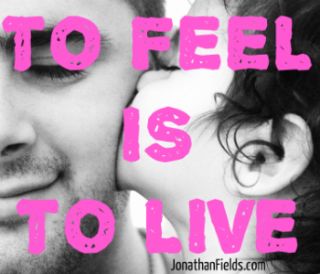Empathy
Feel to Live: The Secret Life of an Empath
I feel other people's emotions as if they’re my own.
Posted May 14, 2013

Confession. I’m an empath.
I feel other people's emotions as if they’re my own.
Often, their pain. On an unusually strong level.
Whether I know them or not.
I shake when I see other people experience awe. I cry during Hallmark specials. Nearly every episode of Extreme Makeover: Home Edition left me a blathering mess. Stuff just seems to get to me more easily than others.
I’ve known this since I was a kid, just didn’t know there was a name for it until recently.
There’s good about it. And bad.
It’s been a huge asset as an entrepreneur, marketer, leader and artist. I can get into peoples’ heads, understand what they need, want, desire, aspire to. What makes them vibrate with emotion, good and bad. It lets me work on more of an emotional level, see past facades and words, then speak to, create and solve for what really matters.
It’s also been hugely beneficial in allowing me to connect when I teach, present and, as I’ve more recently discovered, interview people. In a past life, taking depositions in a dimly-lit cinderblock government room, I felt my way through the conversations on a more intuitive level, processing beyond words.
And, as a human being on a quest to be more human and better understand what this lap on the planet is all about, it lets me know, on a visceral level, what people are experiencing as if I am them. It allows me to see people more easily from a place of grace. To drop the judgment. Not always. And not everyone. I’m still very much a work in progress. But more often than not.
But it also comes with a dark side…
When someone else is in pain, it can be hard to dissociate from it. Whether you know them or not. It can also stop you from being able to help someone else. You’re of no use beyond being a warm body to commiserate, when their pain paralyzes you as much as them.
I was reminded of this, on a personal level, a few weeks ago, when my father-in-law passed away. I felt immediately for my wife’s loss. For her mother, too.
That evening, I sat down down, and told my little girl grandpa was dead.
I was fine until I saw her eyes begin to well. Seeing her heart break, my own shattered. We both lost it. Her, for her loss. Me, for her loss. There was nothing I could do or say, but cry with her. For her.
A few days later at the funeral, I was fine until a childhood friend of my father-in-law got up, and told stories about them in the neighborhood as kids. He struggled to choke back tears, I could barely breathe. Had I been called on to console him or anyone else in that moment, I would’ve been fairly useless.
As an entrepreneur, this dark side reveals itself in the lure of the emotional rabbit hole. I need to be able to tap into others’ emotions to understand how best to serve them. But I also need to be able to convert emotions into businesses, brands, solutions and experiences that matter. To engage with enough dispassion to allow insight and action.
So, what to do?
Completely disconnect with people? Walk around with your shields on high all day? Divert with humor and sarcasm (all part of my arsenal, btw, with varying levels of efficacy).
It’s hard enough to process your own emotion, let alone manage the vein that channels others’ emotions into you.
That said, I wouldn’t change it for the world. Because…
To feel is to live.
It’s the raw fuel that births moments, interactions, experiences and the creation of art and meaning.
The challenge, always is to understand when to let it in, when to raise the shields entirely. And when to let in just enough to fuel connection, wisdom, compassionate action…and extraordinary art.
I’ve danced with this process for as long as I can remember. It fueled intense painting and composing jags as a kid. Converting my own and others’ raw transfered emotion into creative output.
I’m convinced that many of the world’s greatest artists, writers, composers were empaths. Bundling sensed extrinsic emotion with their own and channeling it onto the page, canvas, medium or instrument. Partly, in the quest to create art, but also in the name of survival. A way to open a conduit that allows all that channeled emotion to pour through, rather than consume them.
A few years ago, fueled by an entirely different reason. I found something else that’s helped me process life as an empath.
It doesn’t make everything better. What it does is allow me to understand when I’m being drawn in and then make a more deliberate decision about whether I’m going to open to empathy or compassion. And how much. The latter, allowing me to understand, to see and feel, but with enough detachment to still be able to act.
So, what about you?
How do you feel into others’ emotions?
How might you tap this orientation to live into life a bit more?
As an entrepreneur, how can you leverage it to serve more people on a higher level?
Share your thoughts below…
P.S. – Empaths aren’t always about human emotion. Many are fairly dispassionate toward other people, but their empathic connection runs strongly toward animals or the natural world.
Jonathan Fields is a serial-entrepreneur, business strategist, speaker and author. His latest book is Uncertainty: Turning Fear and Doubt Into Fuel For Brilliance. Fields writes about performance-mindset, innovation, leading and entrepreneurship at JonathanFields.com




